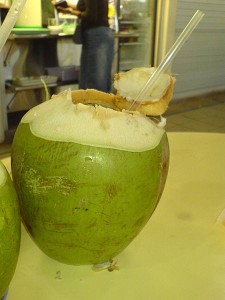Health Matters – Benefits of Coconut Water
Overview
The coconut has received a lot of attention as of late due to its perceived health benefits. In particular, coconut water has been touted in some health enthusiast circles as a viable substitute for sports drinks. It is low in calories and contains vitamins and minerals, including electrolytes, much like commercial energy drinks. But is there anything that sets it apart? There are many benefits of coconut water.
What Is Coconut Water?
Coconut water is the clear liquid found in young coconuts. As the fruit matures, the water is gradually replaced by air and solid coconut meat; therefore, it is important to extract the water early. This water should not be confused with coconut oil or coconut milk, which are both processed from the meat and contain a large amount of calories and fat. Coconut water, on the other hand, has a lot of potassium and lesser amounts of electrolytes such as sodium, phosphorus and magnesium, the American Council on Exercise explains.
Low Calorie, Low Sugar Content
These days, many sports and health enthusiasts are drinking coconut water instead of sports drinks after exercise, the Texas Department of State Health Services reports. It has a low caloric content of just 46 calories per cup and 9 grams of carbohydrates. Coconut water also contains less sugar than many energy drinks and fruit juices. However, to ensure that you’re getting these benefits, be certain that you’re drinking plain coconut water and not those that have added sugar, since these are no different from sodas and processed fruit drinks.
Comparison to Sports Drinks
Like many sports drinks, coconut water contains electrolytes, carbohydrates and water, and offers similar benefits, explains All Systems Fitness. The main difference lies in electrolyte content: coconut water contains a lot more potassium, while sports drinks have more sodium. Since athletes engaging in heavy exercise require more sodium than potassium, coconut water may not be a viable replacement for sports drinks in this respect. It is also worth noting, however, that neither sports drinks nor coconut water contain enough sodium to adequately replace that lost through perspiration, “U.S. News & World Report” explains.
Considerations
Coconut water is a good source of potassium and magnesium. There are no known risks from regular consumption of coconut water. However, it can be a relatively expensive habit to maintain. In addition, keep in mind that coconut water has not yet been well-studied. As far as side effects are concerned, coconut water seems to be much like any fruit or vegetable juice. If you have any health conditions or are currently taking supplements or medication, be sure to consult with your doctor before you include coconut water in your regular diet.
Source & link: http://www.livestrong.com/article/366141-why-drink-coconut-water/#ixzz1MPAGCWNs




I’m very pleased to uncover this site. I want to to thank you for ones time just for this fantastic read!! I definitely liked every part of it and I have you book marked to see new stuff in your website.
I think that is one of the so much important info for me.
And i’m happy reading your article. However should remark on some basic issues, The web site taste is great, the articles is actually excellent : D. Just right process, cheers
Naturally refreshing, coconut water has a sweet, nutty taste. It contains easily digested carbohydrate in the form of sugar and electrolytes. Not to be confused with high-fat coconut milk or oil, coconut water is a clear liquid in the fruit’s center that is tapped from young, green coconuts.,’^”
Please do look over this useful blog site http://homelifestylejournal.com/